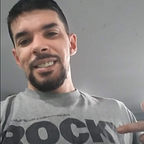The Who’s and Whys of Your Startup Will Determine Whether it Lives or Dies
Lessons learned from fifteen years working side by side with small business owners and startup founders
Full disclosure, I’m not a small business owner. I’ve just been around and worked closely with them over the last fifteen years. They’ve hired me and promoted me and kept me close for a reason. Because I know what I’m talking about. I don’t know why the phrase startup has such a Silicon valley and techy feel to it but it does so just to clarify — When I said startup in the title, I’m more so referring to small businesses. Not the next big app to take off or the trending company that’s working on the newest social media platform but just everyday people who decided they wanted to work for themselves and started mom and pop shop construction companies, local delis and roofing companies. Those are the people I’ve gotten my experience from — watched closely — saw what they did right and what they did wrong. What their strengths and weaknesses were and ultimately why they’ve succeeded thus far or eventually failed. Though I got my experience and drew my lessons from small business owners, much of the following can and should be applied to business in general — regardless of size or industry.
I’ve always been a keen observer. Few things go over my head or get by me. I like to think I know people pretty well. Both individuals close to me and just the human species at large. I can tell you right now, what makes or breaks a company — especially in the beginning — is who is at the head of it and who they hire. Sounds obvious right? Well, so many people get it wrong. People who have no business starting businesses do so to make their ego’s wet dream come true. in order to finally have someone call them boss. Companies built by egomaniacs who started one because they were inspired by a YouTube ad, think it leads to Lambo’s and luxury and just want to impress others, are completely doomed from the start. I’ve seen them come and watched them go.
So many people have a really misconstrued idea of what working for yourself is like. They romanticize it. They exaggerate the positives and completely ignore the negatives. Do you know what owning a small business is really like? Well from what I’ve seen, I think Gary Vaynerchuk summed it up best when he said he’s basically a firefighter because he spends most of his days just putting out metaphorical business fires. I like to think of it as problem-solving though and clearly, that’s what Gary means. owning a business, at least an even semi-successful one, involves constant problems, minor and large. The expected and completely unforeseen. Ones you can’t ignore or walk away from like you can when you’re just an employee, as you think to yourself “not my job, not my problem”. Because I assure you, as a business owner, it’s precisely your problem. Finding a solution to those problems is your primary purpose.
These are the aspects of starting a startup everyone chooses to ignore, while they idolize Tai Lopez and envision themselves as the next Grant Cardone. They ignore the work and zoom in on the benefits. They see the light but not the dark tunnel that led to it and it’s honestly astonishing to me. People playing make pretend with their very real lives. The fairy tale is not a reality.
Aside from who is starting the startup or small business and why, the next biggest threat to its existence is who the owner or founder hires by hand. The people he or she appoints to top positions. From the faces of the company to project managers and foreman — get this wrong too often and your chances of making it past the 3-year mark that so many small businesses don’t, drop drastically.
If the people you depend on to run the day to day operations can’t only mainly solve the inevitable barrage of problems headed their way but also hopefully foresee and plan for a few of them, you probably hired the wrong person. This is an offense your company may be able to survive but it’ll also make it damn near impossible for it to thrive. Think about it like this, if your ultimate long term goal is to eventually take a step back, are these the people you could depend on to run the company without you having to constantly fight their fires for them? If not, you should find people who are as soon as possible.
None of this is meant to discourage anyone from starting a business. It more so just stands as a forewarning to people who want to start them for the wrong reasons. As crazy as this is to say, even focusing on money, in the beginning, is wrong. Yeah, of course your goal should be to make money — but I promise you if it’s your only focus you’ll fail. There’s too many other good reasons to start a business, it’s almost as if the entrepreneurial Gods view monetizing your motives as petty. This doesn’t mean you can’t succeed despite them but why spite them when you could have them on your side?
Consider this not a discouragement but a guide in the right direction, based solely on my experience. I’ve essentially spent the better part of my working career, working side by side with entrepreneurs and small business owners. Many of who I’ve got to be there with when they opened doors on day one — and a few who have unfortunately closed doors since. It just kills me to know they didn’t have to, so I figured I’d write this and hopefully help prevent one small business owner from shutting down shop for good unnecessarily.
